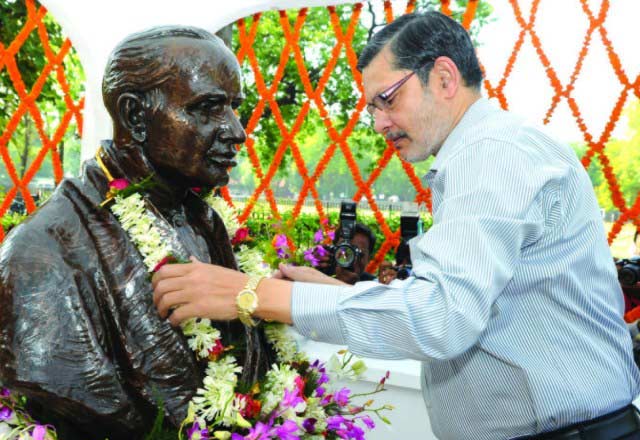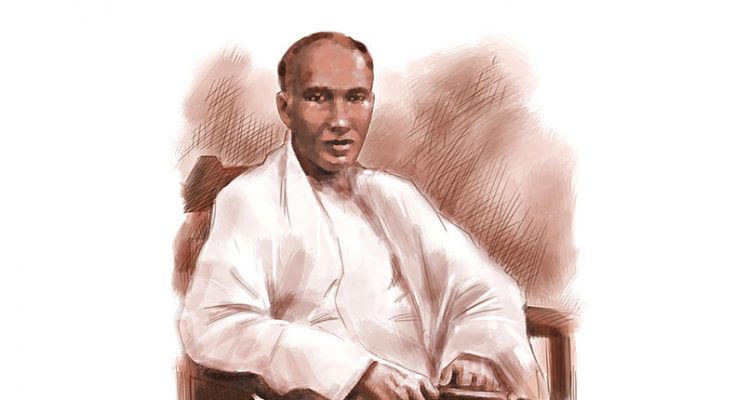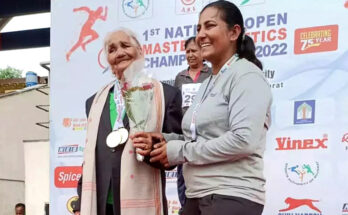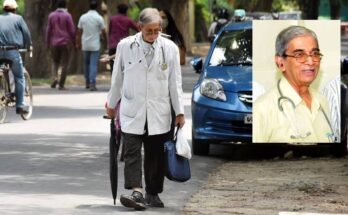Pramatha Nath Basu, the pioneer of the technological revolution in India. Image Courtesy – Telegraph India
Pramatha Nath Basu, the pioneer of the technological revolution in India was born at Gobardanga, West Bengal. The Bengali child was born in an interior village named Gauripur of undivided 24 Parganas of that time. Later, he changed the industrial map of the country.
He was born in 1855. This man was very talented at a young age. At the age of fourteen, he passed matriculation and went to Krishnagar Government College to study. Seeing his talent, the professors sent him to St Xavier’s College in Kolkata after two years.
In the ‘Gilchrist Scholarship Eligibility Test’, he was the first and then he left Kolkata and moved to Cambridge. After coming here he became friend with Rabindranath Tagore in the year 1874. He was the first Indian science graduate from the University of Cambridge by that time. After that, he was admitted to the Royal School of Mines in England. There, his study was on Geology and Fossil which was called Paleontology.
He also became the first in the last test here leaving behind the British young men. But, unlike other Indians, he did not stay with marrying a British girl there; he wanted to return to his country. While in England, he heard that the environment and potential for the development of new industries in India had been created.
He applied for a job at the office of the Secretary of State in London and at the Geological Survey of India (GSI). But, the British government did not give him a job in either of them.
He used to give lectures in different places to cover his expenses. He got acquainted with Dadabhai Naoroji and Anandamohan Basu there. Later he formed a socio-political organization called ‘India Society’. This time he started talking about the deprivation of the British towards Indians in his speech. Realizing the dangerous situation, the British government employed him as Assistant Superintendent in GSI and sent him back to India.
Read: The life story of Steve Jobs – an inspiration for everyone
He was the first Indian to hold this high position in a government organization directly in the year 1880. The beginning of a new milestone in the country’s industry started from that time.
This person was not ready to work under a luxurious environment in the head office at Kolkata. He was a laborious person and his mind always used to haunt him for new explorations. He discovered a huge iron ore mine at Dalhousie in Madhya Pradesh. In the year 1890, he discovered underground coal deposits in the Darjeeling region. Petroleum mines at Digboi and Naharkatiya in Assam were also discovered by this Bengali scientist. India’s first indigenous soap factory was created by Pramatha Nath Basu. But the discovery he is still remembered for happened in 1903 after he retired from the government service.
Mohini Mohan Dhar, the Bengali Diwan of Mayurbhanj state of that time, came to him with a proposal to survey the possibility of getting minerals. Although there was a possibility theoretically, in reality no survey has ever been done in that state. Inspired by his nationalist thinking, Pramatha Nath Basu agreed and started working at that age. Within three months, a huge deposit of underground iron ore was found on the slopes of the Gorumahisani hill.
He wrote in his notebook about the iron ore that he did not know the total amount of iron ore deposits there, but he assumed that it was somehow endless and would provide an indefinite supply to several modern furnaces continuously. Today, we have understood that his assumption was correct. Most of the country’s iron ore is collected from this mine in Orissa even today.
Read: From a software developer to an award-winning farmer – an inspiring life story
This geologist wrote a letter to the local industrialist Jamshedji Tata informing him of the ore deposits in the year 1904. It was mainly his interest that Jamshedji Tata would set up India’s first iron and steel plant at Sakchi near the mine area.
The multi-talented man understood that he needed technical education for the betterment of the industry and so he set up the ‘Bengal Technical Institute’ which was later renamed as Jadavpur University in Kolkata.
Under the pressure of work, however, he did not forget to do his social duty and married Kamala Dutta. She was the daughter of renowned historian and civilian Ramesh Chandra Dutta.

Tata Steel remembers Pramathat Nath Basu on his Birth Anniversary. Image Courtesy – Avenue Mail
Neither the Tata Company nor the people of Jamshedpur have forgotten him. Every year, his birthday is celebrated very gorgeously. Ratan Tata used to come to garland his statue. Jawaharlal Nehru also came in the past to garland his statue.
India will always remember the name of Pramatha Nath Basu, the pioneer of the technological revolution in India and one of the greatest scientists of Bengal.





